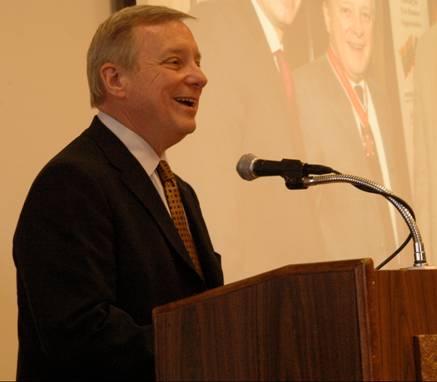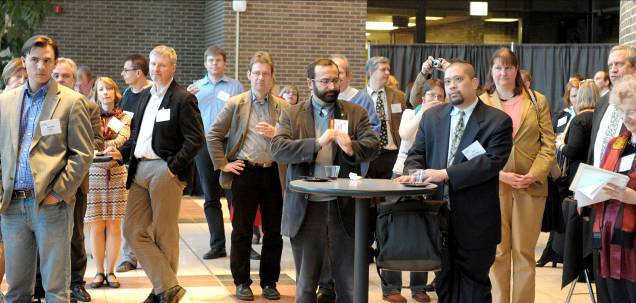
THE VOICE OF INTERNATIONAL LITHUANIA
|
VilNews has its own Google archive! Type a word in the above search box to find any article.
You can also follow us on Facebook. We have two different pages. Click to open and join.
|

U.S. Senator Dick Durbin, who traces his roots to Lithuania, spoke on the
topic of “the unbreakable U.S.-Baltic partnership,” and referred to
the conference as “a family reunion.”
Photo: Jurgis Anysas.
By Ellen Cassedy
“The Global Baltics: The Next Twenty Years” was the subject of the 23rd biennial conference of the Association for the Advancement of Baltic Studies (AABS). The conference took place April 26-28 at the University of Illinois at Chicago.
“We are truly the global Baltics,” said Robert Vitas, chair of the Chicago-based Lithuanian Research and Studies Center, in an opening address. “Wars, migrations, and deportations have wrenched our people beyond our national boundaries. Lithuania is home in our hearts, but the countries of the diaspora are also home.”

More than 200 scholars from 15 countries participated, including some from as far away as Japan and Brazil. Scholars in the field of Lithuanian studies made up about one-quarter of the participants.
Sixty speeches, roundtables, and panel discussions explored Baltic history, literature, linguistics, political science, aesthetics, culture, sociology, psychology, economics, gender, anthropology, musicology, environment, education, and public health.
Numerous members of Chicago’s Baltic-American community turned out for the opening session, which was addressed by the three Baltic ambassadors to the U.S. and two White House representatives.
U.S. Senator Dick Durbin, who traces his roots to Lithuania, spoke on the topic of “the unbreakable U.S.-Baltic partnership,” and referred to the conference as “a family reunion.”
Ever since its beginnings in 1968, according to Bradley Woodworth of the University of New Haven, AABS has striven to maintain strong ties with the émigré communities. “We foster a high level of scholarship,” he said, “but we also want to reflect a deep emotional tie” with the Baltics.
Not only the Baltic nations themselves but the Baltic émigré communities were under discussion.
Some presentations focused on the home countries – for example, the Estonian contribution to digital music, Baltic linguistics in Renaissance Europe, the Latvian SS Voluntary Legion, Soviet art in Lithuania, and Poles in contemporary Klaipeda.
But others focused on such topics as whether the mission of early Lithuanian immigrants to the U.S. was to preserve or to create Lithuanian identity; the meaning of “Lithuanian-ness” outside Lithuania; and the state of Baltic archives and libraries in North America.
Past president Guntis Smidchens, of the University of Washington, recalled that from the very beginnings of the association in 1968, AABS conferences have served as a valuable place for Baltic scholars to share research and seek critiques of their papers. To begin with, “you didn’t need to show where the Baltics were on the map,” he said. “Everyone knew.”
Today, Smidchens said, the conferences are changing, as scholars from the Baltic countries themselves are able to attend, and Baltic studies are on the rise in Europe. At the same time, he voiced disappointment that Baltic language courses are being eliminated at U.S. universities.
Woodworth emphasized that for him, Baltic studies means an exploration of all the peoples who live in the Baltic lands. “The emphasis on Estonia, Latvia, and Lithuania as nation-states has been a real strength,” he said, “but that can go too far. I study the people who live in a certain region, not ethnicities per se. This is not a place for Baltic nationalism.”
Scholars of all three Baltic countries not only joined together in formal discussions but chatted at the coffee urns.
Did the conference create a “pan-Baltic” spirit– a sense of fellow-feeling among Estonians, Latvians, and Lithuanians across national boundaries? Some participants said they felt it, while others did not.
The conference was not all work. Participants perused the exhibits of books and journals and explored the lavish display of artifacts and manuscripts mounted by the Lithuanian Research and Studies Center. In a session chaired by Violeta Kelertas, of the University of Washington, Baltic fiction writers from the U.S. and Canada entertained the participants by reading from their short stories and novels. A Latvian and a Lithuanian men’s choir serenaded the gathering. There was a dinner and a play performance. And conference chair Giedrius Subacius, of the University of Illinois at Chicago, was feted with a rousing Lithuanian birthday song.
The next AABS conference, to be held jointly with the Society for the Advancement of Scandinavian Studies, will take place at Yale University, March 13-15, 2014. Some travel stipends will be offered. Two “sister’ conferences are also in the works. For more information: http://depts.washington.edu/aabs/.
 |
Ellen Cassedy traces her Jewish family roots to Rokiskis and Siauliai. Her new book, We Are Here: Memories of the Lithuanian Holocaust, was published in March and will appear in Lithuanian in May. She lives in Washington, D.C. Visit her website at www.ellencassedy.com. |
- Bookmark :
- Digg
- del.icio.us
- Stumbleupon
- Redit it
VilNews e-magazine is published in Vilnius, Lithuania. Editor-in-Chief: Mr. Aage Myhre. Inquires to the editors: editor@VilNews.com.
Code of Ethics: See Section 2 – about VilNews. VilNews is not responsible for content on external links/web pages.
HOW TO ADVERTISE IN VILNEWS.
All content is copyrighted © 2011. UAB ‘VilNews’.

 Click on the buttons to open and read each of VilNews' 18 sub-sections
Click on the buttons to open and read each of VilNews' 18 sub-sections 


